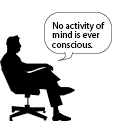No mental activity is conscious
None of the processing that results in conscious experiences is itself conscious—eg when we consciously see an image of a chair and a table standing out against a background, we have no conscious experience of assembling them to make a chair.
K Lashley (1956).

Note: Searle views his connection principal argument as being in part a response to this claim.
See the "Does the connection principle show that consciousness is necessary to thought?" arguments on this map.